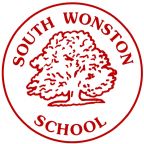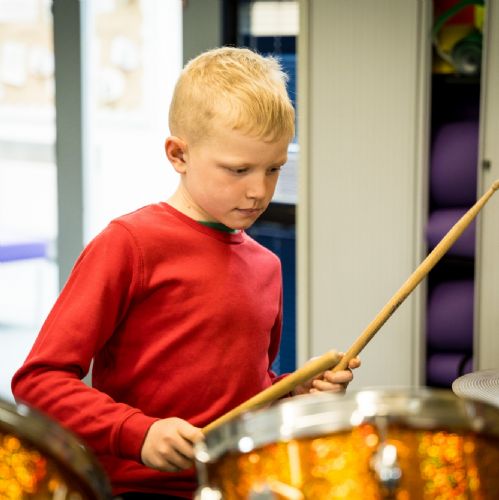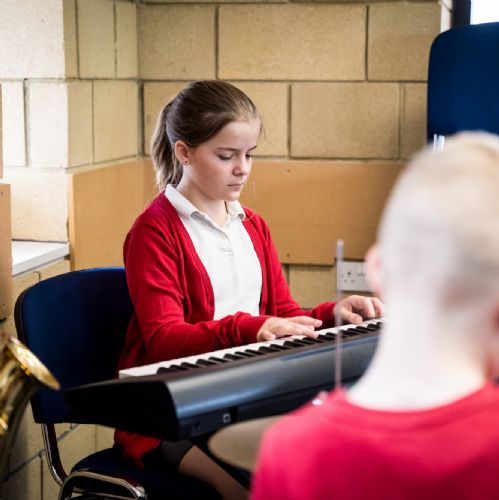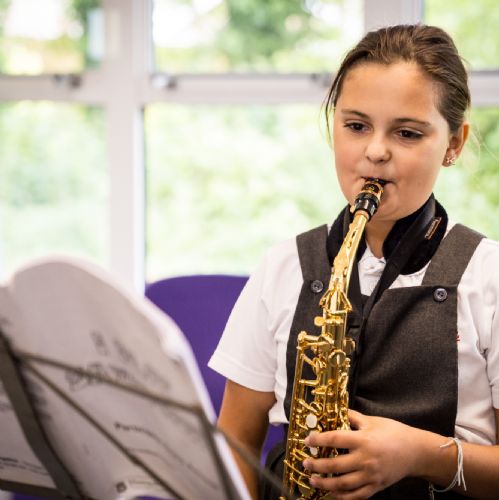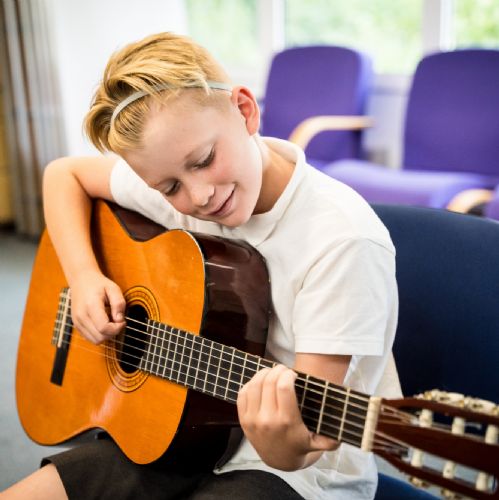Music
What does Music look like at South Wonston?
Intent
At South Wonston Primary School we aim for all our pupils to develop a lifelong love of music, through a wide range of quality musical experiences which engage and inspire them. At the heart of the music curriculum are creativity, curiosity and inspiration which result in children who are developing increased self-confidence, self-esteem and collaborative skills.
We aim to provide an inclusive, progressive and ambitious curriculum, with opportunities to develop skills in performance, listening, singing, improvising and composing for all our pupils.
Through an ambitious, skills-based curriculum children in Year 6 will be able to perform as part of an ensemble, including playing chord accompaniment (guitars / ukuleles / keyboards), melody lines (tuned percussion / keyboards) and vocals (melody line and harmony parts).
Implementation
In line with the Ofsted Music Research Review 2021 we believe that “a central purpose of good music education is for pupils to make more music, think more musically and consequently become more musical” and to that purpose our music curriculum takes a practical, skills-based approach.
To enable all pupils to develop musically we ensure that our curriculum is based on three interrelated pillars that provide the foundation of a musical education.
Technical Pillar: competence in controlling sound (instruments/technology) and use of a ‘communication system’ (notation). Children will develop technical competence on a range of instruments from untuned and tuned percussion as well as developing skills through the Listen2Me project with a focus on keyboard, ukulele, percussion and vocal skills. Children will develop vocal competence, singing in unison at KS1, developing knowledge of rounds and simple part-songs in lower KS2 and developing singing in 2-part harmony in upper KS2.
Constructive Pillar: knowledge of the 7 interrelated of music (dynamics, pitch, tempo, timbre, duration, structure, texture) and how to apply these in composition. Notation is taught incrementally, introducing stick notation for crotchets and quavers in KS1 and blobs for pitch until Upper KS2 children can read and write rhythm notation (crotchets / quavers / semiquaver/ crotchet rest) and some notes on a stave. Pitch notation is supported using colours (consistent with boomwhackers and chime bars)
Expressive Pillar: Creativity is at the heart of our music curriculum and is designed to give children confidence to express their own ideas. This is developed through open-ended tasks in KS1 and encouraged through carefully considered composition and performance opportunities in KS2. Our curriculum covers a breadth of musical genres, allowing children to find their own musical taste and express their own opinions.
In Early Years music is delivered through holistic practice as an integral part of early development. Using ‘Musical Development Matters in the Early Years’ by Nicola Burke as our starting point, we offer broad musical activities to promote and nurture children’s musical development. Adults use planned opportunities for questioning and musical conversations to move learning on. Staff model music making and singing, joining in as well as leading the musical moments in the class. The learning of phonics is supported by using music e.g., sound discrimination in Phase 1 and songs to support cued articulation.
Throughout Key Stage One and Key Stage Two children receive weekly music lessons taught by a music specialist. The music subject leader teaches in Key Stage One and Upper Key Stage Two and the Whole Class Instrumental Programme is taught in Lower Key Stage Two by staff from Hampshire Music Hub (Listen to Me Project).
Music is planned on a two-year spiral curriculum where skills and understanding are frequently revisited, and lessons are planned to develop all learners' needs with equal access for all. This includes opportunities to develop the talents of those children working above expectation and support for those with SEND. This will be evident in lessons e.g., instrument choices / adapted instruments, teacher / TA support, scaffolds for support, use of stave notation or written work.
We have a close working relationship with Hampshire Music Hub enabling us to access high quality wider provision, through staff CPD, visiting teachers, workshops, projects and city- and nation-wide events e.g., ‘Finish This project with the English National Opera’.
Class teachers are involved in music making with their classes and joining in school and class singing. Music is at the core of our school celebrations and allows children the opportunity to perform and sing with their friends and families. Music brings the community together at key moments throughout our school year e.g., Christmas, Leaver’s Performance.
Singing
The whole school comes together for a weekly singing assembly which unites children and staff alike in a special moment of music making.
‘Music Jam’ is a free lunch-time club where children can practise their instruments or play together using class instruments.
Throughout the school singing is used in the classroom with songs linked to learning and topics, as well as a chance to bring the class together or mark moments in the daily routine. Classes use songs when performing to parents in sharing assemblies.
We aim to make links with our feeder secondary schools so that we can support children to carry-on with their musical development beyond their time at South Wonston.
Listening
Our listening curriculum is supported by the ‘Year of Listening’ resource provided by Hampshire Music Hub. Each week there is a different focus for music that is listened to at the beginning and end of assemblies and on a regular basis in classrooms. This covers a range of music from different historical periods, genres, styles and traditions including great composers and musicians. During singing assemblies there is a chance for children to reflect on the piece that week.
Children experience live high quality musical performances throughout the year, often to bring alive an area of learning and allow children to experience the sound first hand either at school or in local concert venues. This critical engagement with music allows children to listen with discrimination. These are often experiences provided by our local Music Hub.
Listening is woven through musical units as an integral part of learning allowing for active listening and development of aural memory. EYFS and KS1 use ‘songdrawing’ techniques to aid development of mark-making and communication and language using music.
Playing
Music lessons are rooted in sound. Children use a wide range of tuned and untuned instruments as well as some music technology. We are also able to use sets of instruments hired from Hampshire Music Hub such as Steel pans and djembe.
All KS1 children are given time to explore handheld percussion instruments, manipulating sound and exploring timbre and pulse, as well as learning basic rhythm notation. Specific units of work focus on tuned percussion, learning the basics of stave notation and technical skills (using 2 beaters and both hands, striking correctly).
Our Whole Class Instrumental Tuition is provided by Hampshire Music Hub’s ‘Listen to Me’ project to all children in Year 3 and 4. Over these two years children develop their musicianship skills and apply these on instruments including ukulele, percussion, keyboard and vocals. During these lessons children will develop their knowledge of notation and apply their technical skills in composition tasks.
Instrumental lessons are offered to all pupils, paid for by parents. During the year they access weekly instrumental lessons (individual or in small group) from visiting peripatetic staff and perform regularly to parents and pupils to share their learning.
Improvising and composing
All musical learning involves creativity. Children improvise and compose their own music within every musical journey. They work in a range of different groups allowing for discussion and critical reflection while developing leadership and group skills.
Music Technology is introduced in used in KS1, with a focus on Chrome Music Lab. In Upper KS2 children use Garageband on iPads to compose dance music tracks and Beepbox to compose music for computer games.
Understanding
Discussions around understanding are rooted in the interrelated dimensions of music (pitch, duration, dynamics, tempo, timbre, texture) and language associated with them. These discussions enable children to make links between their learning and build on prior knowledge. Children are encouraged to engage with music on an emotional level, sharing likes and dislikes and their own, personal response to music. Children are encouraged to understand how music can affect their wellbeing and show mutual respect and collaboration through music, developing these life-long personal skills.
Impact
Our children are engaged and excited by our music curriculum. The skills that they are taught equip them with a range of skills to enable them to appreciate music throughout their lives and enable them to study music at a higher level as their progress
Our children show an appreciation and respect for a range of music from a variety of genres across a variety of generations
Our children have become confident performers, creative composers and active listeners, who are able to express themselves musically at school and beyond.
